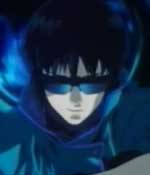by Dan Barry
Depressed yet? The keen criticisms Lain raises are as comforting to most western audiences as gargling nails. But don't throw your laptop out the window yet, kiddies-it gets worse. As if Lain's image of everyday life wasn't foreboding enough, Ghost in the Shell visualizes an even grimmer future. The film focuses on how information technology quite literally escapes the control of its creators: it evolves to the point where it becomes its own autonomous life-form. While the notion of technology-run-amok is nothing new, Ghost puts the theme in a unique light by grounding itself in modern reality. Masamune Shirow evokes a world where connectedness has become so pervasive that today's nations transform into Orwellian techno-corporate conglomerates. Daily life becomes so dependent on technology that many people have cybernetic implants to keep them online, and even the garbage trucks are wired. In the midst of all these believable elements, the film never distinguishes whether the computerized life-form is a bug that arises from the instability of information systems, or an actual case of Darwinian evolution. Nor does it matter; the Puppet Master's right to live becomes undeniable as the film traces his/her/its attempt to qualify its own existence. In leaving this boundary undefined, Ghost in the Shell makes a subtle point: by developing technology, mankind is not necessarily developing itself. Nowhere in the film is this more evident than in the movie's climactic battle, when an evolutionary tree (a recurring image from director Mamoru Oshii's earlier work, Angel's Egg) is suddenly riddled with bullets. Ghost in the Shell indicts today's e-everything culture with having misplaced its focus; technological development as we now handle it is not a solution to our problems, but a distraction from them. Only by understanding the essence of humanity-the ghost that the film leaves so nebulous-can man reach the next stage of self-development. Each episode of Serial Experiments Lain starts off with an obnoxious voice cackling, "Present day... Present time!" to remind the audience the reality of the show is dangerously possible. Ghost in the Shell looks to the future through a lens of increasing globalization and technological advancement, evoking a world that, for all its differences, remains hauntingly familiar. But the past holds lessons about the interaction of human nature and technology, too. In Princess Mononoke, director Hayao Miyazaki plays out modern questions of morality on an ancient stage, proving that technology has always been a philosophical can of worms. His premise is simple enough: life is a purpose unto itself, and all living things have an undeniable right to continue living. But what happens when different groups have conflicts of interests? And, worse yet, what happens when life's ferocious self-perpetuation does more harm than good? Herein lies the grand irony of the film: life will destroy even itself in its desperation for survival. The workers of the Iron Town destroy the forest and its gods, and the gods destroy the humans in mutual disrespect. With the advancement of technology, life has become inimical to itself. This is the logical bullet-Eboshi's bullet-that turns the Deer God into a cancerous death spirit. On the other end of the gun barrel, by ignoring their ties to the natural world, mankind transforms into similarly senseless killers; they disrespect the sanctity of their own kind as well as of the forest gods. Princess Mononoke is not about happy endings. The conflict of the film is resolved, but the moral conflict that set the film into motion remains to this very day. Eboshi's gun (and every weapon thereafter) cannot be un-invented, and this notion helps the film draw a poignant parallel between ancient Japan and modern times. Osa, one of the lepers in Lady Eboshi's town, tells Ashitaka, "The world is cursed, people are cursed, but still we wish to live." Perhaps a few centuries haven't changed us that much.
With Lain, Ghost in the Shell, and Princess Mononoke all ringing mankind's death knell, it's easy to dismiss these anime as pessimistic, fatalistic, and far-fetched. This is, of course, worlds easier than actually facing the issues that such works present, for doing so would mean confronting the fact that mankind might just be doing itself in for good. Even then, it's easy to give unwitting consent to, "There's nothing I can do," logic by acknowledging that no one is the sort of superhuman that Ashitaka, San, Lain, and Kusanagi are. But to do so is to read these works reductively, as well as to disempower oneself. While the anime each have their own words of caution, none of them are anti-technology. Lain's world continues in its present orbit; Kusanagi upgrades computerized life as well as humankind; and even the former free radical Ashitaka acknowledges his place as a human, and goes on to help rebuild the Iron Town that caused him so much trouble. All of the protagonists finish the anime with drastically different perspectives on technology and how it should (or should not) be used. The films, unlike most of Hollywood's hit-and-run entertainment, issue a direct challenge to the viewer to take command of their own perspectives in the same way. By living a doctrine of intelligent use, rather than our current over-dependent abuse of technology, we can begin to turn the machine around. Otherwise, when the apocalypse comes, we'll have no one to blame but ourselves. |
||||||||
|
Serial Experiments Lain © Triangle Staff / PIONEER LDC.
Ghost in the Shell © Masamune Shirow / Kodansha Ltd / Bandai Visual Ltd.
Princess Mononoke © NIBARIKI-TNDG / Buena Vista Home Entertainment Inc.
|
||||||||

